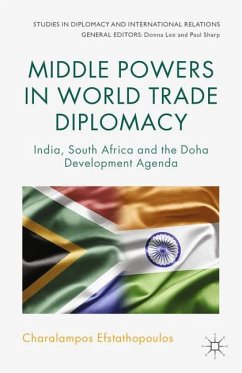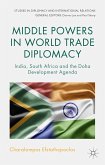Examining how leading developing countries are increasingly shaping international economic negotiations, this book uses the case studies of India and South Africa to demonstrate the ability of states to exert diplomatic influence through different bargaining strategies and represent the interests of the developing world in global governance.
"Global governance is increasingly influenced by emerging economies, something which the status quo powers must acknowledge and accommodate. Nowhere is this better exemplified than in the discussions within the WTO, not least in the Doha round of talks. This important book provides a much-needed comparative analysis of the roles of two key developing countries India and South Africa in these often contentious deliberations. The author's detailed analysis gives an excellent overview and analytical appraisal of how New Delhi and Pretoria adopted various positions during the Doha process and why. As the BRICS become ever more important in global affairs, Charalampos Efstathopoulos' book is a major contribution in the current debates about the role of Southern powers in global governance and how this is likely to play out in the future." - Ian Taylor, University of St. Andrews, UK








